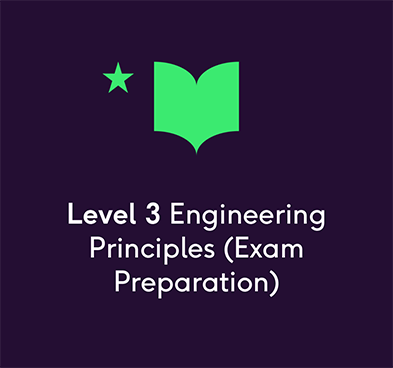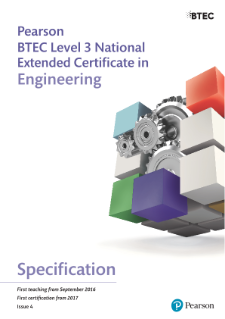September 2016 saw the launch of new BTEC Level 3 Nationals qualifications in Engineering and the majority of students registered with the awarding body from September 2017 would have been enrolled onto these new style qualifications.
The new BTECs contain externally assessed units. This means that learners studying a BTEC Level 3 in Engineering from September 2017 will more than likely be required to take an exam. This exam will be used to assess a core unit, Engineering Principles (Unit 1).
As this is a mandatory component of the new BTEC Level 3 Nationals in Engineering, it is not something that can be avoided.
In an earlier article, I outlined the challenges faced by Schools and Colleges responsible for delivering this unit (you can read it here), but today we are going to be looking at this from the learner’s perspective.
Challenge 1: Preferred Assessment Methods
Students of vocational qualifications often prefer to be assessed with assignments, avoiding the need to sit exams. Having spoken to BTEC students about exams, I know that the vast majority would rather avoid them entirely!
There may be a number of reasons for this. For example, the learner may not feel that they can demonstrate their knowledge and understanding most effectively when placed in the exam environment. It may be because in an exam, you only have one opportunity, on one given day, whereas you have more time to think about and work on assignments. Or it may be because there is a greater likelihood of failing an exam, with additional pressures of potential retakes.
Whatever the reason, most BTEC Level 3 Nationals students will be required to sit an exam for a relatively large and technical unit, which is something that may place them under additional pressure.
Challenge 2: Volume of Content
The second major challenge arises because of the volume of content in the Engineering Principles unit, all of which could potentially be assessed in the exam. The unit covers applied Mathematics, as well as fundamental Mechanical and Electrical / Electronic principles.
The unit accounts for 120 hours of a 720-hour National Diploma qualification. What this means in practical terms is that this single unit accounts for almost 20% of the overall qualification. Unlike with other units in the qualification, the learner will not be able to accrue pass criteria as they progress through the unit. They will need to demonstrate knowledge and understanding of all of that content in the final exam.
Not only that, as there are only two opportunities to sit the examination, learners must be able to recall information that was covered at the start of the unit. This content may have been delivered up to 40 weeks before the final exam!
Challenge 3: Technical Nature of Content
As mentioned above, this unit covers applied Mathematics, as well as fundamental Mechanical and Electrical / Electronic principles. Most learners naturally prefer either Mechanical or Electrical Engineering and generally are more capable in one or other of the disciplines. This unit requires students to learn and be able to apply principles from both Engineering disciplines.
Students who favour Mechanical Engineering will need to work at the same pace as their peers when covering Electrical content and vice versa for students who favour Electrical Engineering. There may not be sufficient time in the academic year to ensure that all learners understand all of the topics in the unit specification.
A Solution for Proactive Learners
 At the Engineers Academy, we understand the challenges faced by learners who are studying BTEC Level 3 Engineering programmes. We understand that performance in this unit alone, could have a huge impact on the final grades achieved by students on these programmes.
At the Engineers Academy, we understand the challenges faced by learners who are studying BTEC Level 3 Engineering programmes. We understand that performance in this unit alone, could have a huge impact on the final grades achieved by students on these programmes.
We appreciate that most students will accept the need to sit an examination and will want to prepare as best as they can. On that note, we believe that learners should be encouraged to identify their own strengths and areas for improvement in this unit. This will enable them to work on their weaknesses to develop their understanding and hence, improve their overall grade.
It is also important to note that revision (particularly in areas identified as requiring improvement) is essential in order to perform well in this type of assessment. The difficulty is that not all learners will have the same areas for improvement, so this will need to be done independently and outside of the classroom.
 For these reasons, we have developed our Level 3 ND Engineering Principles (Exam Preparation and Revision) course. This is a fully comprehensive online course, covering every single topic on the Engineering Principles unit specification. There are video tutorials and self-assessment practice questions, where coding is used to ensure that repeated sets or practice questions differ from earlier attempts. This encourages a greater level of understanding, rather than memorising solutions.
For these reasons, we have developed our Level 3 ND Engineering Principles (Exam Preparation and Revision) course. This is a fully comprehensive online course, covering every single topic on the Engineering Principles unit specification. There are video tutorials and self-assessment practice questions, where coding is used to ensure that repeated sets or practice questions differ from earlier attempts. This encourages a greater level of understanding, rather than memorising solutions.
Students on our online courses also receive weekly reports, where it is clear at a glance what progress has been made, as well as where individual strengths and weaknesses lie.
To find out more about this course please use the link below:
https://engineers.academy/product/l3-nd-engineering-principles-exam-preparation/
 You can also register for the free Engineers Academy Free Sample Lessons below, to experience the study platform for yourself:
You can also register for the free Engineers Academy Free Sample Lessons below, to experience the study platform for yourself:

